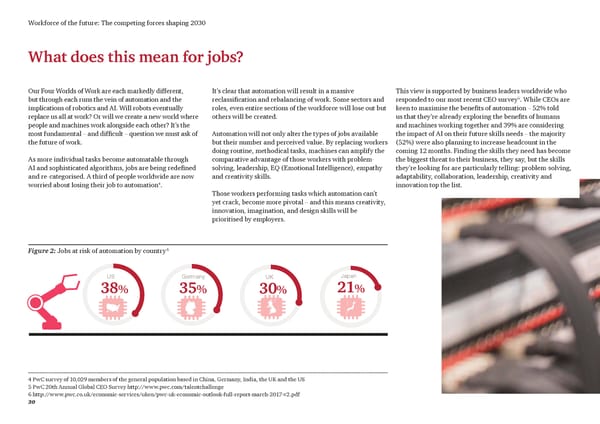Workforce of the future: The competing forces shaping 2030 What does this mean for jobs? Our Four Worlds of Work are each markedly different, It’s clear that automation will result in a massive This view is supported by business leaders worldwide who but through each runs the vein of automation and the reclassification and rebalancing of work. Some sectors and responded to our most recent CEO survey5. While CEOs are implications of robotics and AI. Will robots eventually roles, even entire sections of the workforce will lose out but keen to maximise the benefits of automation – 52% told replace us all at work? Or will we create a new world where others will be created. us that they’re already exploring the benefits of humans people and machines work alongside each other? It’s the and machines working together and 39% are considering most fundamental – and difficult – question we must ask of Automation will not only alter the types of jobs available the impact of AI on their future skills needs – the majority the future of work. but their number and perceived value. By replacing workers (52%) were also planning to increase headcount in the doing routine, methodical tasks, machines can amplify the coming 12 months. Finding the skills they need has become As more individual tasks become automatable through comparative advantage of those workers with problem‑ the biggest threat to their business, they say, but the skills AI and sophisticated algorithms, jobs are being redefined solving, leadership, EQ (Emotional Intelligence), empathy they’re looking for are particularly telling: problem‑solving, and re‑categorised. A third of people worldwide are now and creativity skills. adaptability, collaboration, leadership, creativity and 4 worried about losing their job to automation . innovation top the list. Those workers performing tasks which automation can’t yet crack, become more pivotal – and this means creativity, innovation, imagination, and design skills will be prioritised by employers. Figure 2: Jobs at risk of automation by country6 US Germany UK Japan 38% 35% 30% 21% 4 PwC survey of 10,029 members of the general population based in China, Germany, India, the UK and the US 5 PwC 20th Annual Global CEO Survey http://www.pwc.com/talentchallenge 6 http://www.pwc.co.uk/economic‑services/ukeo/pwc‑uk‑economic‑outlook‑full‑report‑march‑2017‑v2.pdf 30 100
 Workforce of the Future | 2030 Page 29 Page 31
Workforce of the Future | 2030 Page 29 Page 31